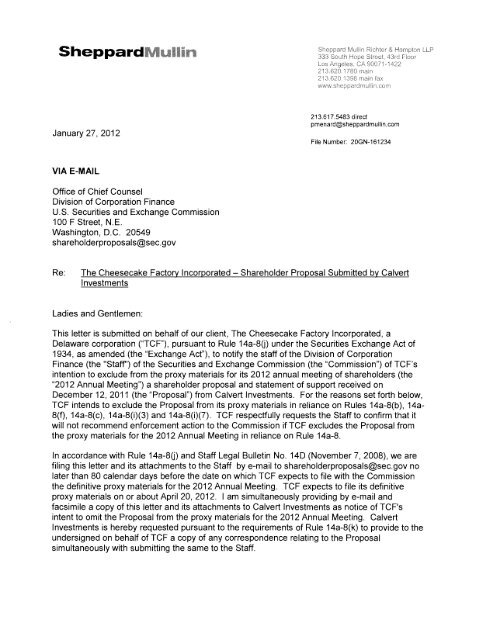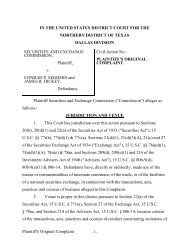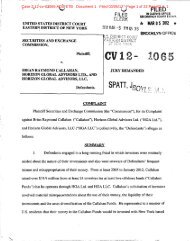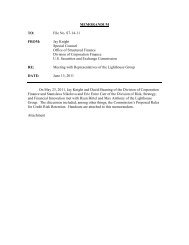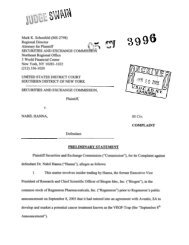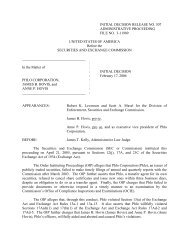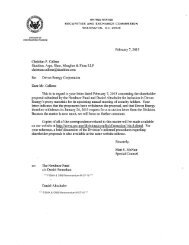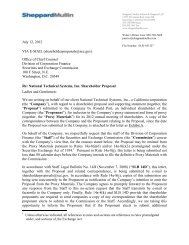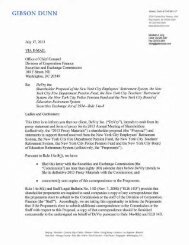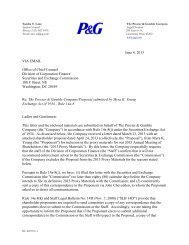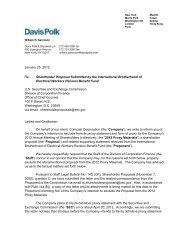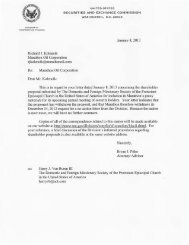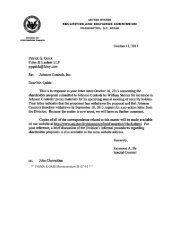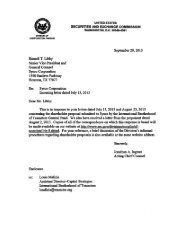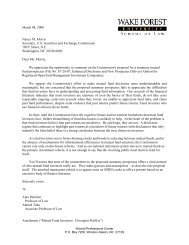SheppardMullin
Rule 14a-8 no-action letter - Securities and Exchange Commission
Rule 14a-8 no-action letter - Securities and Exchange Commission
You also want an ePaper? Increase the reach of your titles
YUMPU automatically turns print PDFs into web optimized ePapers that Google loves.
<strong>SheppardMullin</strong> <br />
January 27, 2012<br />
213.617.5483 direct<br />
pmenard@sheppardmullin.com<br />
File Number: 20GN-161234<br />
VIA E-MAIL<br />
Office of Chief Counsel<br />
Division of Corporation Finance<br />
U.S. Securities and Exchange Commission<br />
100 F Street, N.E.<br />
Washington, D.C. 20549<br />
shareholderproposals@sec.gov<br />
Re:<br />
The Cheesecake Factory Incorporated - Shareholder Proposal Submitted by Calvert<br />
Investments<br />
Ladies and Gentlemen:<br />
This letter is submitted on behalf of our client, The Cheesecake Factory Incorporated, a<br />
Delaware corporation ("TCF"), pursuant to Rule 14a-80) under the Securities Exchange Act of<br />
1934, as amended (the "Exchange Act"), to notify the staff of the Division of Corporation<br />
Finance (the "Staff') of the Securities and Exchange Commission (the "Commission") of TCF's<br />
intention to exclude from the proxy materials for its 2012 annual meeting of shareholders (the<br />
"2012 Annual Meeting") a shareholder proposal and statement of support received on<br />
December 12, 2011 (the "Proposal") from Calvert Investments. For the reasons set forth below,<br />
TCF intends to exclude the Proposal from its proxy materials in reliance on Rules 14a-8(b), 14a<br />
8(f), 14a-8(c), 14a-8(i)(3) and 14a-8(i)(7). TCF respectfully requests the Staff to confirm that it<br />
will not recommend enforcement action to the Commission if TCF excludes the Proposal from<br />
the proxy materials for the 2012 Annual Meeting in reliance on Rule 14a-8.<br />
In accordance with Rule 14a-80) and Staff Legal Bulletin No. 140 (November 7,2008), we are<br />
filing this letter and its attachments to the Staff bye-mail to shareholderproposals@sec.gov no<br />
later than 80 calendar days before the date on which TCF expects to file with the Commission<br />
the definitive proxy materials for the 2012 Annual Meeting. TCF expects to file its definitive<br />
proxy materials on or about April 20, 2012. I am simultaneously providing bye-mail and<br />
facsimile a copy of this letter and its attachments to Calvert Investments as notice of TCF's<br />
intent to omit the Proposal from the proxy materials for the 2012 Annual Meeting. Calvert<br />
Investments is hereby requested pursuant to the requirements of Rule 14a-8(k) to provide to the<br />
undersigned on behalf of TCF a copy of any correspondence relating to the Proposal<br />
simultaneously with submitting the same to the Staff.
<strong>SheppardMullin</strong><br />
Office of Chief Counsel<br />
Division of Corporation Finance<br />
January 27,2012<br />
Page 2<br />
I. The Proposal<br />
The Proposal requests that TCF's shareholders approve the following resolution:<br />
RESOLVED: Shareholders request that the Board of Directors prepare a<br />
sustain ability report describing corporate policies and programs on workplace<br />
diversity and labor relations, product safety, environmental management, and<br />
addressing supply-chain risks, specifically vendor standards and compliance<br />
mechanisms for its vendors. The report, prepared at reasonable cost and<br />
omitting proprietary information, should be published by October 2012.<br />
II.<br />
Background<br />
On December 12, 2011, TCF received a letter dated December 8, 2011, a copy of which is<br />
attached as Exhibit A, presenting the Proposal for vote at the 2012 Annual Meeting. A copy of<br />
the Proposal, consisting of a lengthy 'Whereas" clause, the resolution quoted above and a<br />
supporting statement, appears as an exhibit to that letter. Although the letter was on the<br />
letterhead of Calvert Investments, it was signed by an employee of Calvert Social Index Series,<br />
Inc. ("Calvert Social Index") and Calvert Variable Products, Inc ("Calvert Variable Products"),<br />
neither of which is a registered holder of TCF stock, and stated that "[a]s long-standing<br />
shareholders, we are filing the enclosed [proposal]." The letter purported to present the<br />
Proposal on behalf of the Calvert Social Index Fund, the Calvert VP S&P Mid Cap 400 Index<br />
Fund and the Calvert VP Russell 2000 Small Cap Index Portfolio (collectively, the "Funds"),<br />
none of which is a registered holder of TCF stock. The letter represented that (1) the Funds<br />
were beneficial owners of at least $2,000 of TCF stock, (2) each Fund had held these shares<br />
continuously for at least one year, and (3) each Fund intended to continue to own shares in TCF<br />
through the date of the 2012 Annual Meeting. The letter further pledged to provide under<br />
separate cover supporting documentation of the Funds' ownership of TCF stock.<br />
Under cover of a letter dated December 19, 2011, and signed by an employee of Calvert<br />
Investment Management, Inc. ("Calvert Investment Management"), TCF was provided with a<br />
letter dated December 15, 2011 from State Street Corp. to Calvert Investment Management<br />
setting forth the number of shares of TCF stock held by each of the Funds continuously<br />
between December 2, 2010 and December 9, 2011. This letter, together with the<br />
accompanying letter of State Street Corp., is attached as Exhibit B. Although this letter was<br />
received by TCF's mailroom on December 20, 2011, it was not delivered to TCF's management<br />
until December 29, 2011 due to a clerical error.<br />
By letter dated December 22, 2011, a copy of which is attached as Exhibit C, TCF requested<br />
Calvert Investments to provide TCF with proof that the Funds satisfied the share ownership<br />
requirements of Rule 14a-8 as of the date that they submitted the Proposal. This lettert was<br />
accompanied by a copy of Rule 14a-8(b)(2). At the time this letter was sent to Calvert<br />
Investments, TCF's management was not aware that Calvert Investments had provided the<br />
foregoing letter from State Street Corp. and, accordingly, limited its response to the Proposal to<br />
a request for proof that the Funds satisfied the share ownership requirements.
<strong>SheppardMullin</strong> <br />
Office of Chief Counsel<br />
Division of Corporation Finance<br />
January 27,2012<br />
Page 3<br />
Upon delivery to management of the letter of Calvert Investment Management dated December<br />
19, 2011, with the accompanying letter from State Street Corp., TCF promptly requested Calvert<br />
Investment Management by letter dated January 3,2012, a copy of which is attached as Exhibit<br />
D, to:<br />
• clearly identify the person submitting the Proposal on behalf of the Funds;<br />
• provide proof that the person submitting the Proposal was, at the time of submitting the<br />
Proposal, and continued to be, authorized to submit the Proposal on behalf of the Funds;<br />
• provide a statement from each Fund, or a person authorized to speak on behalf of each<br />
Fund, that the Fund intended to own or hold the minimum number of shares of TCF<br />
stock required to meet the share ownership requirements of Rule 14a-8 through the date<br />
of the 2012 Annual Meeting; and<br />
• provide copies of the investment advisory contracts between Calvert Investment<br />
Management and each of the Funds, as well as the constituent documents of the Funds,<br />
to demonstrate that Calvert Investment Management had the authority to submit the<br />
Proposal and to make the representation concerning investment intent on behalf of the<br />
Funds.<br />
Calvert Investment Management failed to respond to TCF's letter dated January 3,2012.<br />
The letters dated December 8, 2011 and December 19, 2011 intermingle Calvert Investments,<br />
Calvert Investment Management, Calvert Social Index and Calvert Variable Products without<br />
regard to the separate existence of these legal entities or any explanation as to their relationship<br />
to each other or the Funds. Other than the fact that the name of each of these entities and the<br />
Funds include the word "Calvert," TCF has no way of knowing whether these entities and the<br />
Funds are related or whether any of these entities has the authority to act on behalf of any of<br />
the others. For simplicity, these entities are collectively referred to in this letter as "Calvert."<br />
III.<br />
Grounds For Exclusion<br />
TCF believes the Proposal may properly be excluded from the proxy materials for the<br />
2012 Annual Meeting pursuant to:<br />
• Rule 14a-8(b) because Calvert failed to establish its authority to submit the Proposal on<br />
behalf of the Funds;<br />
• Rule 14a-8(f) because Calvert failed to provide TCF with a statement from each Fund, or<br />
a person authorized to speak on behalf of each Fund, that the Fund intends to own or<br />
hold the minimum amount of TCF stock required by the rule through the date of the<br />
2012 Annual Meeting;<br />
• Rule 14a-8(c) because the Proposal contains multiple proposals;
<strong>SheppardMullin</strong> <br />
Office of Chief Counsel<br />
Division of Corporation Finance<br />
January 27,2012<br />
Page 4<br />
• Rule 14a-8(i)(3) because the Proposal is so vague and indefinite as to be misleading;<br />
and<br />
• Rule 14a-8(i)(7) because the Proposal deals with matters relating to the Company's<br />
ordinary business operations.<br />
IV.<br />
Discussion<br />
A. Rule 14a-8(b) - Calvert Has Not Demonstrated that it is Authorized to<br />
Submit the Proposal on Behalf of the Funds<br />
To be eligible to submit a proposal under Rule 14a-8(b), a proponent must have continuously<br />
held at least $2,000 in market value, or one percent, of the company's securities entitled to be<br />
voted on the proposal at the shareholder meeting for at least one year by the date that the<br />
proponent submitted the proposal. As the Staff has made clear, only beneficial owners with an<br />
economic interest in the shares that provide the basis for the submission of a shareholder<br />
proposal may submit such proposals. See, e.g., Chesapeake Energy Corporation (Apr. 13,<br />
2010) (concurring in the exclusion of a co-proponent on the basis that it "had no economic stake<br />
or investment interest in the company by virtue of the shares held in its clients' accounts"); The<br />
Western Union Company (Mar. 10,2010) (concurring in the exclusion of a proposal on the basis<br />
"that the proponent has no economic stake or investment in the company by virtue of the shares<br />
held in its clients' accounts").<br />
We respectfully submit that TCF may exclude the Proposal from the proxy materials for the<br />
2012 Annual Meeting based on the foregoing guidance. Calvert has failed to demonstrate that it<br />
is eligible to submit the Proposal- either as a shareholder in its own right or on behalf of the<br />
Funds. Calvert is not a registered holder of TCF stock nor is it a beneficial owner of TCF stock.<br />
Instead, it is submitting the Proposal on behalf of the Funds, which also are not registered<br />
holders of TCF stock. Even if the Funds are beneficial owners of TCF stock, Calvert has not<br />
demonstrated that it is authorized to submit the Proposal on their behalf.<br />
As noted above, TCF brought these deficiencies to Calvert's attention in TCF's letters dated<br />
December 22, 2011 and January 3, 2012. In these deficiency letters, TCF informed Calvert of<br />
the minimum share ownership requirements of Rule 14a-8, provided a copy of Rule 14a-8(b)(2),<br />
and requested that (1) Calvert resolve the ambiguity as to whether Calvert Investments, Calvert<br />
Investment Management, Calvert Social Index or Calvert Variable Product was submitting the<br />
Proposal on behalf of the Funds, (2) demonstrate that the Funds satisfied the minimum share<br />
ownership requirements of Rule 14a-8, and (3) demonstrate that Calvert was authorized to<br />
submit the Proposal on behalf of the Funds. Notwithstanding the fact that TCF clearly identified<br />
the deficiencies in Calvert's submissions, Calvert has failed to identify the person submitting the<br />
Proposal on behalf of the Funds or to demonstrate that such person was authorized to submit<br />
the Proposal on behalf of the Funds. These failures provide TCF with a basis for excluding the<br />
Proposal from the proxy materials for the 2012 Annual Meeting.
<strong>SheppardMullin</strong> <br />
Office of Chief Counsel<br />
Division of Corporation Finance<br />
January 27,2012<br />
Page 5<br />
The requirements of Rule 14a-8 are highly technical. As a result, the Staff has properly required<br />
a company seeking to exclude a proposal on the grounds of technical deficiencies to clearly<br />
identify the deficiencies and to permit the proponent a reasonable opportunity to correct the<br />
deficiencies. TCF fully agrees with the Staff's position that the technical requirements of Rule<br />
14a-8 should not constitute a "gotcha." TeF has clearly identified the deficiencies in the<br />
Proposal. Calvert has not only failed to cure the deficiencies but has failed even to respond. It<br />
should also be noted that according to its website (www.calvert.com/sri-resolutions.html) the<br />
Calvert family of mutual funds includes 43 funds with over $12.5 billion under management and<br />
has sponsored 132 shareholder proposals in the 2009,2010,2011 and 2012 proxy seasons.<br />
As a sophisticated investor and experienced proponent of shareholder proposals, Calvert<br />
should understand the requirements of Rule 14a-8. Calvert's disregard of these requirements<br />
and failure to respond to notice of the deficiencies in the Proposal warrant the exclusion of the<br />
Proposal from the proxy materials for the 2012 Annual Meeting.<br />
The Staff consistently has permitted the exclusion of a proposal submitted by an investment<br />
adviser that manages funds that beneficially own the relevant voting securities, in the absence<br />
of proof that the investment adviser is authorized to submit proposals on behalf of the funds it<br />
manages. See, e.g., Chesapeake Energy Corp. (Apr. 13, 2010); The Western Union Co.<br />
(Mar. 10, 2010 and Mar. 4, 2008). In each of these letters, the Staff concluded that the failure to<br />
provide information demonstrating that an investment adviser was authorized to submit a<br />
proposal on behalf of its clients provided a basis for excluding the proposal under Rule 14a-8(b).<br />
Calvert has failed to demonstrate that it is authorized to submit the Proposal on behalf of the<br />
Funds j despite TCF's clear and timely request for such proof. Accordingly, in reliance on the<br />
interpretive positions reflected in Chesapeake Energy and The Western Union Company, TCF<br />
intends to exclude the Proposal from the proxy materials for the 2012 Annual Meeting.<br />
B. Rule 14a-8(f) - The Funds Have Not Provided a Written Statement That<br />
They Intend to Hold the Requisite Amount of Securities Through the Date<br />
of the 2012 Annual Meeting<br />
Rule 14a-8(b) requires that a proponent hold the securities that entitle the proponent to submit<br />
the shareholder proposal through the date of the meeting and provide the company with a<br />
written statement of its intent to do so. To implement this requirement, Rule 14a-8(b)(2)<br />
requires the beneficial owner of the voting securities to submit its "own written statement that [it]<br />
intend[s] to continue to hold the securities through the date of the meeting of shareholders." In<br />
its December 8, 2011 letter, Calvert stated that "each Fund intends to continue to own shares in<br />
[TCF] through the date of the 2012 annual meeting of shareholders" (emphasis added), which<br />
can be read to mean that each Fund intends to hold as few as two shares of TCF stock rather<br />
than the number of shares required to meet the share ownership requirements of Rule 14a-8.<br />
Calvert has failed to respond to TCF's request that either (1) each Fund provide a statement<br />
that it intends to hold the minimum number shares of TCF stock required to meet the share<br />
ownership requirements of Rule 14a-8 through the date of the 2012 Annual Meeting, or (2) if<br />
such statement is provided by a third party on behalf of the Funds, that such person<br />
demonstrate that it is authorized to make that representation on behalf of the Funds.
<strong>SheppardMullin</strong> <br />
Office of Chief Counsel<br />
Division of Corporation Finance<br />
January 27,2012<br />
Page 6<br />
The Staff has permitted the exclusion of a proposal where the proponent has failed to provide a<br />
statement that it would continue to own the requisite amount of stock through the date of the<br />
meeting. See, e.g., Energen Corp. (Feb. 22, 2011).<br />
The Proposal is distinguishable from the recent no-action request in Hanesbrands Inc. (Jan. 13,<br />
2012) in which the Staff was unable to concur in the exclusion of a proposal requesting the<br />
board of directors of Hanesbrands Inc. to issue a report describing the company's vendor<br />
standards pertaining to reducing supply chain environmental impacts on water use and related<br />
pollution. In Hanesbrands, the company sought to exclude the proposal on the grounds that the<br />
investment advisor to the proponent had failed to provide the company with a statement from<br />
the proponent itself regarding its intent to hold the minimum amount of stock required by<br />
Rule 14a-8. By contrast, TCF has merely requested Calvert to demonstrate that it is authorized<br />
to make that representation on behalf of each of the Funds. As noted above, Calvert's letters<br />
dated December 8, 2011 and December 19, 2011 intermingle Calvert Investments, Calvert<br />
Investment Management, Calvert Social Index and Calvert Variable Product without any<br />
explanation as to their relationship to each other or the Funds. Other than the fact that the<br />
name of each of these entities and the Funds include the word "Calvert," TCF has no way of<br />
knowing whether these entities and the Funds are related or whether any of these entities has<br />
the authority to act on behalf of any of the others. In contrast to the hypertechnical argument<br />
made in Hanesbrands (that based on the language of Rule 14a-8(b)(2)(i) the proponent must<br />
provide its own written statement that it intends to continue to hold the securities through the<br />
date of the meeting), TCF has merely requested Calvert to demonstrate that it is authorized to<br />
make that representation on behalf of each of the Funds.<br />
Calvert has failed (1) to correct its initial statement on behalf of each Fund to indicate that the<br />
Fund intends to hold the requisite amount of TCF's stock through the date of the 2012 Annual<br />
Meeting (rather than merely an unspecified number of shares) or (2) to demonstrate that it is<br />
authorized to make that representation on behalf of each Fund despite TCF's clear and timely<br />
request for such proof. Accordingly, in reliance on the interpretive position reflected in Energen,<br />
TCF intends to exclude the Proposal from the proxy materials for the 2012 Annual Meeting in<br />
reliance on Rule 14a-8(f).<br />
c. Rule 14a-8(c) - The Proposal Contains Multiple Proposals<br />
Rule 14a-8(c) provides that a stockholder may submit only one proposal for a particular<br />
shareholder meeting. The Proposal, however, requests the board of directors of TCF to report<br />
on corporate policies and programs relating to myriad disparate aspects of the company's<br />
operations. As a result, a shareholder may be obliged to vote in favor of the production of one<br />
or more reports he or she would otherwise oppose in order to support the production of a single<br />
report he or she might believe to be appropriate. The subject matters of the reports requested<br />
by the Proposal- workplace diversity, labor relations, product safety, environmental<br />
management, and supply chain management - are unrelated. A shareholder who supports the<br />
production of a report on supply chain management in the belief that this subject matter involves<br />
significant social policy issues may oppose a report on workplace diversity, labor relations or<br />
product safety on the grounds that it would intrude into the day-to-day operations of the
<strong>SheppardMullin</strong> <br />
Office of Chief Counsel<br />
Division of Corporation Finance<br />
January 27,2012<br />
Page 7<br />
company properly delegated to management and, accordingly, would waste the company's<br />
resources and divert the attention of management. By bundling requests for reports on multiple<br />
unrelated topics, the Proposal deprives shareholders of the opportunity to communicate to the<br />
board of directors their views on the appropriateness of each of the topics. See Exchange Act<br />
Release No. 34-31326 (October 16, 1992).<br />
The Staff has consistently recognized that Rule 14a-8(c) permits the exclusion of proposals<br />
combining separate and distinct elements that lack a single, well-defined unifying concept, even<br />
if the elements are presented as part of a single program and relate to the same general subject<br />
mater. See, e.g., Parker-Hannifin Corp. (Sept. 4, 2009) (concurring in the exclusion of a<br />
"triennial executive pay vote program" consisting of three elements); PG&E Corp. (Mar. 11,<br />
2010) (concurring in the exclusion of a proposal requiring multiple actions to mitigate the risks<br />
involved in the operation of a power plant); Duke Energy Corp. (Feb. 27, 2009) (concurring in<br />
the exclusion of a proposal requesting stock ownership guidelines for director candidates, new<br />
conflict of interest disclosure and restrictions on director compensation); General Motors Corp.<br />
(Apr. 9, 2007) (concurring in the exclusion of a proposal seeking shareholder approval for a<br />
corporate restructuring consisting of multiple transactions); Centra Software, Inc. (Mar. 31,<br />
2003) (concurring in the exclusion of a proposal requesting amendments to the bylaws to<br />
require separate meetings of the independent directors and that the chairman of the board not<br />
be a company officer or employee); HealthSouth Corp. (Mar. 28, 2006) (concurring in the<br />
exclusion of multiple proposals related to giving shareholders the power to add directors of their<br />
own choosing); Exxon Mobil Corp. (Mar. 19, 2002) (concurring in the exclusion of multiple<br />
proposals related to the diversification of the board); Allstate Corp (Jan. 29, 1997) (concurring<br />
that a submfssion constituted multiple proposals when it requested that the company adopt<br />
cumulative voting and then avoid certain actions alleged to impair the effectiveness of<br />
cumulative voting).<br />
Like the proposals in the precedents discussed above, the Proposal requests reports on<br />
multiple aspects of the company's operations that are related only by Calvert's vague assertion<br />
that they each relate to the amorphous category of "environmental, social and governance<br />
performance." Accordingly, because the Proposal requires shareholders to approve or reject all<br />
or none of the subject matters to be covered by the report, and in reliance on the interpretive<br />
positions cited above, TCF intends to exclude the Proposal from the proxy materials for the<br />
2012 Annual Meeting under Rule 14a-8(c) because it does not relate to a single, well-defined<br />
unifying concept.<br />
D. Rule 14a-8(i)(3) - The Proposal Is So Vague and Indefinite as to be<br />
Misleading<br />
Rule 14a-8(i)(3) permits a company to exclude from its proxy materials a shareholder proposal if<br />
"the proposal or supporting statement is contrary to any of the Commission's proxy rules,<br />
including Rule 14a-9, which prohibits materially false or misleading statements in proxy soliciting<br />
materials." The Staff has consistently taken the position that vague and indefinite shareholder<br />
proposals are inherently misleading and therefore excludable under Rule 14a-8(i)(3) because<br />
"neither the stockholders voting on the proposal, nor the company in implementing the proposal
<strong>SheppardMullin</strong> <br />
Office of Chief Counsel<br />
Division of Corporation Finance<br />
January 27, 2012<br />
Page 8<br />
(if adopted), would be able to determine with any reasonable certainty exactly what actions or<br />
measures the proposal requires." Staff Legal Bulletin No. 14B (Sept. 15, 2004). See also Dyer v.<br />
SEC, 287 F.2d 773, 781 (8th Cir. 1961) ("[I]t appears to us that the proposal, as drafted and<br />
submitted to the company, is so vague and indefinite as to make it impossible for either the<br />
board of directors or the stockholders at large to comprehend precisely what the proposal would<br />
entaiL"); Puget Energy, Inc. (Mar. 7, 2002) (concurring in the exclusion of a proposal requesting<br />
that the company's board of directors "take the necessary steps to implement a policy of<br />
'improved corporate governance"'); Capital One Financial Corp. (Feb. 7, 2003) (concurring in<br />
the exclusion of a proposal under Rule 14a-8(i)(3) where the company argued that its<br />
shareholders "would not know with any certainty what they are voting either for or against").<br />
The Proposal uses the term "sustainability" no fewer than ten times, but nowhere defines the<br />
term. In fact, the supporting statement requests that the company's report "should include the<br />
company's definition of sustainability." Based on the statement in the recital that implementing<br />
and disclosing "sustainability practices" can improve TCF's operating results, a shareholder<br />
might infer that sustainable practices are those that enable a business to remain profitable, a<br />
necessary condition to continuity. Based on the numerous references in the recital to social<br />
responsibility, however, a shareholder might infer that sustainable practices are those that<br />
minimize the social impact of a company's business activities. The Proposal asks the<br />
shareholders to request the board of directors to prepare a "sustainability report," and the board<br />
of directors to create a definition of "sustainability," with no guidance as to the standards that<br />
are to be applied. Even if it were possible for the board of directors to articulate a standard for<br />
"sustainability," and then to apply that standard to its policies and programs, the resulting report<br />
would likely be labeled "self-serving" by one or more of the shareholders who expected that they<br />
were voting for something altogether different. TCF respectfully submits that the proponent<br />
should have provided guidance to the board of directors as to which of the disparate notions of<br />
"sustainability" should be used in the report requested in the Proposal.<br />
In reliance on the interpretive positions cited above, TCF intends to exclude the Proposal from<br />
the proxy materials for the 2012 Annual Meeting in reliance on Rule 14a-8(i)(3) because the<br />
Proposal is so vague and indefinite as to be misleading.<br />
E. Rule 14a-8(i)(7) - The Proposal Deals With Matters Relating to the<br />
Company's Ordinary Business Operations<br />
1. Overview ofthe Ordinary Business Exclusion and the Exception for<br />
Significant Policy Issues<br />
Rule 14a-8(i)(7) permits a company to exclude from its proxy materials a shareholder proposal<br />
that relates to its "ordinary business operations." The policy underlying the ordinary business<br />
exclusion is "to confine the resolution of ordinary business problems to management and the<br />
board of directors, since it is impracticable for shareholders to decide how to solve such<br />
problems at an annual shareholders meeting." Exchange Act Release No. 34-40018 (May 21,<br />
1998) (the "1998 Release").
<strong>SheppardMullin</strong> <br />
Office of Chief Counsel<br />
Division of Corporation Finance<br />
January 27,2012<br />
Page 9<br />
The 1998 Release identified two "central considerations" for the ordinary business exclusion.<br />
The first was that "[c]ertain tasks are so fundamental to management's ability to run a company<br />
on a day-to-day basis that they could not, as a practical matter, be subject to direct shareholder<br />
oversight." The Commission noted that, "[e]xamples include the management of the workforce,<br />
such as the hiring, promotion, and termination of employees, decisions on production quality<br />
and quantity, and the retention of suppliers." The second consideration was "the degree to<br />
which the proposal seeks to 'micro-manage' the company by probing too deeply into matters of<br />
a complex nature upon which shareholders, as a group, would not be in a position to make an<br />
informed judgment." Id. (citing Exchange Act Release No. 34-12999 (Nov. 22, 1976)).<br />
In the 1998 Release, the Commission noted that the term "ordinary business" refers to matters<br />
that are not necessarily "ordinary" in the common meaning of the word, but instead the term "is<br />
rooted in the corporate law concept of providing management with flexibility in directing certain<br />
core matters involving the company's business and operations."<br />
A proposal will not be deemed to relate to a company's ordinary business operations merely<br />
because it requests the company to prepare a report, form a committee, include disclosure in a<br />
Commission report or engage in the evaluation of risk. In determining whether such a proposal<br />
may be excluded under Rule 14a-8(i)(7), the Staff wi" consider whether the underlying subject<br />
of the report, committee, disclosure or risk assessment involves a matter of ordinary business.<br />
If it does, the proposal wi" be excludable. Staff Legal Bu"etin 14E (October 27,2009).<br />
In the 1998 Release, the Commission recognized that "proposals relating to [ordinary business]<br />
matters but focusing on sufficiently significant social policy issues (e.g., significant discrimination<br />
matters) generally would not be considered to be excludable." In determining whether the<br />
subject matter of a proposal is a significant policy issue, the Staff considers the proposal and<br />
the supporting statement as a whole. Staff Legal Bu"etin 14C (June 28,2005).<br />
In applying these principles, the Staff has refused to permit the exclusion of proposals<br />
requesting reports regarding the effects of a company's operations on the environment. For<br />
example, in both Chesapeake Energy Corp. (April 13, 2010) and Ultra Petroleum Corp.<br />
(March 26, 2010), the Staff refused to concur with the exclusion of proposals requesting that<br />
each company prepare a report summarizing the effects of the company's fracturing operations<br />
on the environment because the proposals "focuse[d] primarily on the environmental impacts" of<br />
the company's operations. Likewise, in Sun Trust Banks, Inc. (Jan. 13, 2010), the Staff did not<br />
permit the exclusion of a proposal that requested a "sustainability report describing strategies to<br />
address the environmental and social impacts of [the company's] business, including strategies<br />
to address climate change."<br />
However, when a proposal is focused on risks to the company, rather than social policy, it is<br />
excludable. For example, in JP Morgan & Chase Co. (Mar. 12, 2010) the Staff considered a<br />
proposal that requested a report "assessing the impact of [mountain top removal coal mining by<br />
JPMorgan's] clients on the environment" and the "adoption of a policy barring future [JP<br />
Morgan] financing of companies engaged in [mountain top removal coal mining]." The Staff<br />
permitted JPMorgan to exclude the proposal because it impacted JPMorgan's ordinary business
<strong>SheppardMullin</strong><br />
Office of Chief Counsel<br />
Division of Corporation Finance<br />
January 27,2012<br />
Page 10<br />
operations, such as its "decision to extend credit or provide other types of financial services to<br />
particular types of customers." See also Wal-Mart Stores, Inc. (Mar. 21, 2011) (concurring in<br />
the exclusion of a proposal requesting a report on the risks created by actions to avoid or<br />
minimize taxes); UnitedHealth Group Incorporated (Mar. 16, 2011) (concurring in the exclusion<br />
of a proposal requesting a report on how the company is responding to regulatory, legislative<br />
and public pressures to ensure affordable health care coverage and measures taken to contain<br />
the price increases associated with health care premiums); ExxonMobil Corporation (Mar. 3,<br />
2011) (concurring in the exclusion of a proposal requesting a report on U.S. government<br />
subsidies that reduced the costs of doing business and any associated reputational risks);<br />
PepsiCo., Inc. (Mar. 3, 2011) (concurring in the exclusion of a proposal requesting a report on<br />
various public policy issues); Pepco Holdings, Inc. (Feb. 18, 2011 ) (concurring in the exclusion<br />
of a proposal requesting a report on market opportunities for non-commercial renewable solar<br />
power); Pfizer Inc. (Feb. 16, 2011) (concurring in the exclusion of a proposal requesting a report<br />
on the risks created by actions to avoid or minimize taxes); The Home Depot, Inc. (Mar. 2,<br />
2011) (concurring in the exclusion of a proposal requesting a report on the risks created by<br />
actions to avoid or minimize taxes); PetSmart, Inc. (Apr. 8, 2009) (concurring in the exclusion of<br />
a proposal requesting a report on the feasibility of phasing out the sale of live animals);<br />
Foundation Coal Holdings, Inc. (Mar. 11, 2009) (concurring in the exclusion of a proposal<br />
requesting a report on how the company is responding to rising regulatory and public pressure<br />
to significantly reduce the social and environmental harm associated with carbon dioxide<br />
emissions from its operations and from the use of its primary products); CONSOL Energy Inc.<br />
(Feb. 23, 2009) (concurring in the exclusion of a proposal requesting a report on how the<br />
company is responding to rising regulatory and public pressure to significantly reduce the social<br />
and environmental harm associated with carbon dioxide emissions from its operations and from<br />
the use of its primary products); Alpha Natural Resources, Inc. (Feb. 17, 2009) (concurring in<br />
the exclusion of a proposal requesting a report on how the company is responding to rising<br />
regulatory and public pressure to significantly reduce the social and environmental harm<br />
associated with carbon dioxide emissions from its operations and from the use of its primary<br />
products); General Electric Co. (Jan. 9, 2009) (concurring in the exclusion of a proposal<br />
requesting a report on the costs and benefits of divesting the company's nuclear energy<br />
investment and instead investing in renewable energy); Walgreen Co. (Oct. 13, 2006)<br />
(concurring in the exclusion of a proposal requesting a report as to the extent to which the<br />
company's private label cosmetics and personal care products contain harmful chemicals that<br />
accumulate in the body or persist in the environment); Newmont Mining Corp. (Feb. 5, 2005)<br />
(concurring in the exclusion of a proposal requesting management to review its policies<br />
concerning waste disposal at certain of its mining operations, with a particular reference to<br />
potential and public health risks incurred by the company).<br />
2. The Focus of the Proposal is on Ordinary Business Operations, Not<br />
Significant Policy<br />
The Staff has consistently permitted the exclusion of proposals that focus on a company's dayto-day<br />
business activities regardless of the fact that such day-to-day activities implicate larger<br />
social issues.
SheppardMullln<br />
Office of Chief Counsel<br />
Division of Corporation Finance<br />
January 27, 2012<br />
Page 11<br />
The Proposal requests the board of directors of TCF to report on specific aspects of the<br />
company's operations - workplace diversity, labor relations, product safety, environmental<br />
management, and supply-chain issues, specifically vendor standards and compliance<br />
mechanisms for vendors. The recital to the proposed shareholder resolution argues that<br />
implementing and disclosing TCF's practices with respect to these specific areas of operations<br />
can reduce the cost of goods sold, lower operating expenses, manage risks, and protect TCF's<br />
brand value.<br />
Unlike the proposals in Chesapeake Energy Corp. and Ultra Petroleum Corp., which focused<br />
primarily on the environmental impacts of the company's operations, the Proposal is focused on<br />
the impact of TCF's policies and programs on TCF's financial results, rather than the social<br />
impact of such policies and programs. The effect of TCF's policies and programs relating to<br />
workplace diversity, labor relations, product safety, environmental management, vendor<br />
standards and vendor compliance on TCF's results of operations are issues at the very core of<br />
TCF's day-to-day operations and are not appropriate subjects for direct shareholder oversight.<br />
3. The Proposal Seeks Direct Shareholder Oversight of, and to Micro<br />
Manage, Day-to-Day Business Operations<br />
The Proposal seeks direct shareholder oversight of, and to micro-manage, basic components of<br />
TCF's day-to-day business operations. Assessing the impact on TCF's operations of such<br />
subjects as workplace diversity, labor relations, product safety, environmental management,<br />
vendor standards and vendor compliance, and adjusting the company's policies and practices<br />
with regard to each of these subjects, involve both (1) fundamental management functions and<br />
(2) complex issues upon which shareholders, as a group, are not qualified to make an informed<br />
judgment. Indeed, most of the business activities on which the Proposal requests a report are<br />
included in the examples provided by the Commission in the 1998 Release as not being suitable<br />
for shareholder oversight, namely workforce management, production quality and supplier<br />
retention. The requested report would require a detailed explanation of how TCF manages its<br />
workforce, product production, quality control, food safety, and purchasing of raw materials,<br />
thereby encompassing virtually every aspect of TCF's business. The preparation of this report<br />
would be expensive, divert critical management resources from TCF's day-to-day operations,<br />
and involve issues that the average shareholder would not have sufficient expertise to<br />
understand. In effect, the Proposal is based on the assumption that either (1) the Commission's<br />
disclosure requirements under Form 1 O-K are inadequate to provide the information required by<br />
the average shareholder to make an informed investment decision or (2) TCF has failed to<br />
comply with these requirements. The requested report involves precisely the direct shareholder<br />
oversight and micro-management of the basic components of TCF's day-to-day business<br />
operations that the Commission and the Staff have consistently prohibited in the 1998 Release,<br />
Staff Legal Bulletins 14C and 14E and the interpretive positions taken in response to the noaction<br />
requests summarized above.
SheppardMullln<br />
Office of Chief Counsel<br />
Division of Corporation Finance<br />
January 27,2012<br />
Page 12<br />
4. The Proposal Relates to TCF's Compliance with Applicable Law<br />
The Staff has consistently permitted the exclusion of proposals that relate to a company's<br />
compliance with applicable law on the grounds that legal compliance is part of ordinary business<br />
operations. See e.g., Johnson & Johnson (Feb. 22, 2010) (concurring in the exclusion of a<br />
proposal requesting the company to verify the employment status of employees using specified<br />
procedures); FedEx Corporation (July 14, 2009) (concurring in the exclusion of a proposal<br />
requesting an independent committee to report on compliance of the company and its<br />
contractors with laws governing classification of employees); Verizon Communications Inc.<br />
(Jan. 7, 2008) (concurring in the exclusion of a proposal requesting that the board of directors<br />
adopt policies to ensure the company and its contractors do not engage in illegal trespass<br />
actions and report on policies for preventing and handling illegal trespass incidents); Ford Motor<br />
Company (Mar. 19, 2007) (concurring in the exclusion of a proposal requesting appointment of<br />
an independent legal advisory commission to investigate alleged violations of law); Bank of<br />
America Corporation (Jan. 11, 2007) (concurring in the exclusion of a proposal requesting<br />
creation of a position to review whether the company adequately defends and upholds the<br />
economy and security of the U.S.); The AES Corporation (Jan. 9, 2007) (concurring in the<br />
exclusion of a proposal requesting creation of oversight committee to monitor compliance with<br />
applicable laws, rules and regulations of federal, state and local governments); Monsanto Corp.<br />
(Nov. 3, 2005) (concurring in the exclusion of a proposal requesting establishment of oversight<br />
committee for compliance with code of ethics and applicable federal, state and local rules and<br />
regulations); Humana Inc. (Feb. 25, 1998) (concurring in the exclusion of a proposal requesting<br />
that the board of directors appoint a committee of outside directors to oversee the company's<br />
corporate anti-fraud compliance program to investigate possible corporate misconduct and<br />
report to shareholders the findings of its review); General Electric Co. (Jan. 4, 2005) (concurring<br />
in the exclusion of a proposal requesting a report detailing the company's broadcast television<br />
stations' activities to meet public interest obligations); and Allstate Corp. (Feb.16, 1999)<br />
(concurring in the exclusion of a proposal requesting an independent shareholder committee to<br />
investigate issues of illegal activity by the company).<br />
The recital to the Proposal argues that TeF's response to regulations, including those involving<br />
product safety and employment discrimination, can damage TeF's brand value. TeF's business<br />
is subject to extensive labor, health, safety and environmental regulations, all as discussed in<br />
considerable detail in its Annual Reports on Form 10-K. The monitoring, assessment of and<br />
compliance with regulatory requirements is an important and complex component of TeF's dayto-day<br />
business operations. TeF has implemented comprehensive procedures to review and<br />
make risk assessments, and detect and report violations, of laws, regulations and policies. The<br />
fact that some of these laws, regulations and policies may implicate significant policy issues<br />
does not mean that the compliance procedures themselves constitute significant policy issues.<br />
To insert shareholders into what are otherwise routine management decisions would interfere<br />
with management's core function of overseeing TeF's compliance programs.
SheppardMullln<br />
Office of Chief Counsel<br />
Division of Corporation Finance<br />
January 27, 2012<br />
Page 13<br />
5. The Proposal Relates to TeF's Relationships with its Vendors<br />
The manner in which TCF imposes vendor standards and monitors compliance by its vendors<br />
with these standards and internal policies are matters that are fundamental to the day-to-day<br />
management of TCF's operations. The fact that some of these policies may parallel significant<br />
policy issues does not mean that the standards, policies or compliance procedures themselves<br />
constitute significant policy issues. To insert shareholders into what are otherwise routine<br />
management decisions would interfere with management's core functions of overseeing TCF's<br />
compliance programs and managing its relationships with its vendors.<br />
The Commission has consistently permitted companies to exclude shareholder proposals<br />
pursuant to Rule 14a-8(i)(7) that interfere with a company's business relationships with its<br />
suppliers. See, e.g., Alaska Air Group, Inc. (Mar. 8, 2010) (concurring in the exclusion of a<br />
proposal requesting a report disclosing maintenance and security standards used by contract<br />
repair stations and the company's procedures for overseeing maintenance performed by<br />
contract repair stations); Dean Foods Company (Mar. 9, 2007) (concurring in the exclusion of a<br />
proposal requesting an independent committee review the company's policies to protect the<br />
company's brands and reputation and address consumer criticism).<br />
TCF contracts with hundreds of vendors at any given time. The contractual relationship<br />
between TCF and its vendors govern matters as varied as product and performance<br />
specifications, quality standards, food and product safety, financial cost, and delivery<br />
requirements, among other issues. The dynamics of these relationships require the balancing<br />
of a wide array of business, cultural, legal, internal and external factors, none of which can be<br />
reviewed in isolation from the other factors. Like the proposals in Alaska Air Group and Dean<br />
Foods Company, by requiring a report "addressing supply-chain risks, specifically vendor<br />
standards and compliance mechanisms for its vendors," the Proposal impermissibly seeks<br />
direct shareholder oversight and micro-management of a fundamental aspect of TCF's day-today<br />
operations on which shareholders would not be equipped to make an informed judgment.<br />
Because the Proposal focuses on matters relating to TCF's ordinary business operations, rather<br />
than on significant policy issues, TCF intends to exclude the Proposal from the proxy materials<br />
for the 2012 Annual Meeting in reliance on Rule 14a-8(i)(7).<br />
V. Conclusion<br />
It is TCF's position that Calvert and the Funds are ineligible to submit the Proposal because<br />
(i) Calvert failed to demonstrate that it is authorized to submit the Proposal on behalf of the<br />
Funds, and (ii) the Funds failed to provide a written statement of their intent to hold the requisite<br />
amount of TCF stock through the date of the 2012 Annual Meeting. Assuming for the sake of<br />
argument that Calvert and the Funds are not ineligible, the Proposal may be excluded because<br />
(i) the Proposal contains multiple proposals, (ii) the Proposal is so vague and indefinite as to be<br />
misleading, and (iii) the Proposal deals with matters relating to TCF's ordinary business<br />
operations. As a result, and based on the facts and the interpretative positions discussed<br />
above, TCF believes that it may exclude the Proposal from its 2012 proxy materials pursuant to
SheppardMullln<br />
Office of Chief Counsel<br />
Division of Corporation Finance<br />
January 27, 2012<br />
Page 14<br />
Rules 14a-8(b), 14a-8(f), 14a-8(c), Rule 14a-8(i)(3) and 14a-8(i)(7). By this letter, TCF<br />
respectfully requests confirmation that the Staff will not recommend enforcement action to the<br />
Commission if TCF excludes the Proposal from the proxy materials for the 2012 Annual<br />
Meeting.<br />
By copy of this letter, TCF is notifying Calvert Investments of TCF's intention to omit the<br />
Proposal from the proxy materials for the 2012 Annual Meeting.<br />
In accordance with Staff Legal Bulletin 14F (October 18, 2011), please send your response to<br />
this letter to the undersigned bye-mail atpmenard@sheppardmullin.com. If you have any<br />
questions regarding this request or desire additional information, please contact me at (213)<br />
617-5483.<br />
Very truly yours,<br />
fA fyI. (Y)~<br />
Peter M. Menard<br />
for SHEPPARD, MULLIN, RICHTER & HAMPTON LLP<br />
Attachments<br />
cc:<br />
Debby Zurzolo, Esq.<br />
Ivy Wafford Duke, Esq.<br />
Bennett Freeman<br />
Stu Dalheim
EXHIBIT A
Calvert - ==<br />
INVESTMENTS, =<br />
December 8,2011<br />
Ji \\ /7<br />
U \"'1<br />
t,(~" D,r.:::, (r-;::, U\J<br />
DEC 1 2 7.0H<br />
r~;}~()l?",'i'{ fwnilH:. €tliH"'j,., .'l;fj }0;;'14<br />
Ifl:\ !E::;;, ,\~::::::) :::.-" tOL");~AgOi) ! ~l;':.'Wf•.lIVt:t~ fljn!<br />
Ms. Debby Zurzolo<br />
Executive Vice President, CorporateSec:retary and General Counsel <br />
Tbe Cheesecake Facto~yJncorparated <br />
2690 t Malibu Hills Road <br />
Cala~sas I-HUs; CA 91301 <br />
Dear Ms. Zurzolo:<br />
Calvert lnvestmetit Ml;1nagenlent, Inc. ("Calvert"), a registered investment advisor, provides<br />
investment advice fot the 4Jmutllal funds sponsoi-ed by Calvert Investments, Inc., including22<br />
funds that apply sustainabilitycriteria. As of Decetnbet' 7,201 1, Calveti had over $12.5 billion<br />
in assets under manageluent.<br />
The Calvel't Social Index FUlrd, the Calwrt VP S&P MidCap40Q Index POl'tfoHo and the Calvert<br />
VP Russell 2000 SmaIl Capln9.ex Portfolio ("Funds") are beneficial owners of at least $2,000 in<br />
market value ofsecurities entitled to be voted at the next shareholder meeting (supporting<br />
docllmentation.to foHow under separate cover). FurthetTI1ore, each Fund has held these<br />
securitiescontill\lOusly for at least one year, and each Fund intends to continue to own shares in<br />
the Company through the date of the 20 i2, anIlual meeting ofshareholders.<br />
We~re notifying you, ill a timely manner, that we ate presenting the enclosed ~hareholder<br />
proposal fOI'vote at the upcoming stockholders meeting. We submit it for inclusion in the proxy<br />
staternent inaccordante with Rule 14a-8 under the Securities Exchange Act of 1934 (17 C.F.R. §<br />
240.14a-8).<br />
As long-standingsbareholders; we are filing the enclosed, requestillg that the Board of Directors<br />
provide a sustainability l'epDrf to shareholders, prepared at reasonable. cost and olnit:tifJg propriety<br />
il1formation, d~scribing cotporate policies and programs on workplace diversity and labor<br />
relations, product safety, ~nvil'O!1l11ent~1 management, and addressing S'upplY'·chail1 risks,<br />
specifically vendor standards and compliance mechanisms fot: its vei1dOl:S and suppIier8.While<br />
We appreciate the: confet-ence can with the company oh December 6, 2011, we '\¥etc not satisfied<br />
with the (}utcon1e.<br />
If prior to the annual meeting you agree to the request outlined in the resolution, we believe that<br />
this resolu1ion would be unnecessal'Y, Please direct any cotrespondence to Mike Lombardo~ at<br />
30] -961-4756, ,or contact him via email atrnike.lombardo@ciJ.ivcrt.com.<br />
We appreciate your attention to this matter andiook forward toworlcing with you.
S!Qcerely, . . IU<br />
1~ (/~~ j:-? -e<br />
,<br />
fvy Wafford Duke, Esq.<br />
Assistant Vice President atld ASStstantSecretary, Caivelt Social Index Series, Inc. and Calvert<br />
VariablePraducts, Inc.<br />
Ellclosures: Resolution Text<br />
Cc~<br />
Bennett FI'ternan. Senior Vice President.forSustainability Research and. Polley, Calvert<br />
Investment Management, Inc.<br />
Stu Da1heill1, Director ofShareholder Advocacy, Calvert Investment Management, Iuc.<br />
Mike Lomba/'do•. Senior Sustah1ability Ahalystalld MMagel', Index, Calvert Investment<br />
Management, Inc,<br />
Ellen Kentledy, Senior Susfainability Analyst, Calvert Investment Management, fne.<br />
Jill Peters, Vice President, Investor Relations, The Cheesecake Factory Incorporated
SnstllinabHity Report ResOlution <br />
The Cheesecake Factory Incorporated - 2012 Annual Meeting <br />
WHEREAS; Investors iLicl'easingry seek disclosure of companies' social and<br />
envirorunental practices in the belief that they impact shar~holder value; Many investors<br />
'believe companies that are good employers, environmental stewards, aild corporate<br />
citizen!)~ are more fikety to generate stronger finanGl!lll'eturns" be11er respond to emerging<br />
lsstles; and enjoy IOllg..term business success.<br />
Mainstream financial companies are.continuing to recognize the links between<br />
environnlelital, social and governance ("ESG") performance and shareholder value, As<br />
such,thea:vailability of ESG perfonnartce data is growingthtough \l wide range of data<br />
pl'Oviders, slrch a~ BloQmberg. AlSo, investment firifi~ like Goldman Sachs and Deutsche<br />
Asset Managcmeutare increasinglyi,ncorporatingcQrporate social and ~nyiromnental<br />
practices -into theirinvestmen~ decisions. Fmtheril1ore,the United Nations' Principles for<br />
RespOllsible lnvestulent. a set ofguid\,'!lilles that can be adopted by institutiohal investors<br />
addressing ESG issues, has approximately 920 signatories representing $30 trllli0l1 assets<br />
under managemen1 as ofJuly, 2011.<br />
There has been anincl'case incorporate management ofESG issttesand corporate<br />
susf&inabllity repOl'tjng~ According to a 2011' survey, 95:% of the Global Fortune 250<br />
cQmpanies now release corporate responsib1lity data, which is an incrense of 11% since<br />
2008 (,KPMG International Survey of Corpbrate Responsibility Reporting 20ll}.<br />
Food retailers- have significantsustainabilityimpacts related to j)l'odud safety,<br />
environment, workforce, and supply-chain management. In the restaurant industry,<br />
companies lik;e Starbuoks have taken the lead in addressing these key impacts through<br />
comprehe1lsivesllstatllabiHty repot'ting~ Ollr Company does no1 provide sustainability<br />
repol1ing. As investors,.we beHevethat implementing and disclosing sustainabiHty<br />
pra\:ticescan help a company manage and reduce the cost of goods sold, through energy<br />
and tr;'Illspcn1atiolI efficiencies, or employee diversity programs that may reduce turnover,<br />
thus, roweling ovetal1 operating expenses.<br />
Sustaiitahility disclosure alsq helps hwestots understand how the company is addressing<br />
eil1erging regulatory OJ reputational risks, such as product safety bre~ches, discriminatio.11<br />
law'suitsby employees" or supply chain risks> all ofwhich Can have a drunagihg impact<br />
on the brand' value ofa company.<br />
Managing these sustainability opportunities ancl risks is incl'easingly becoming a<br />
competitive advantage.<br />
RESOLYEO: Shareholdet's reqllest that the Board of Directors prepare a sllstaiJwbifily<br />
fepm1 describing. corporate pOlicies and programs on workplace diversity and labor<br />
relations, product safety,environmental managem,ent, and addressing supply-chain risks j<br />
specifically vendor stahdards and compliance mechanisms for its vendors. The,report,
prepared at reasonable {;ost and otniUing proptietary information, should be published by<br />
October 2012. .. .<br />
SUPPORTING STATEMENT: The report s])0\11d include the company's definition of<br />
sltStainability and a company-wide re.view ofcompai1Y policies, practkes~ and tnetdcs<br />
related to long:-term sodal ami envh~bntl1erttalsustainhbil1ty.<br />
We re.comm:etld that The Cheesecake Factmy fnco:rpOrated use the Global Reporting<br />
Initiative's Su.staillabHity RepOlting Guidelines to prepare the report The Global .<br />
Reporting Initiative (www.globalreporting.org) IS an international organization developed<br />
with representafivesfmm the business, environn'lci1ta1 1 human lights, and labor<br />
communities.
EXHIBITB
Calvert --<br />
INVESTMENTS -<br />
December 19, 2011<br />
4550 lviontgomery Avl'l1ue, Bethesda, MO 20814<br />
30l.95L48()O ! wvvwcaivertcam<br />
Ms. Debby Zurzolo<br />
Executive Vice President, Corporate Secretary and General Counsel<br />
The Cheesecake Factory Incorporated<br />
26901 Malibu Hills Road<br />
Calabasas Hills, CA 91301<br />
Dear Ms. Zurzolo:<br />
I am writing to follow up on the shareholder proposal submitted to The Cheesecake Factory in<br />
regards to sustainability reporting that Calvert Investment Management, Inc. submitted on<br />
December 8, 2011.<br />
Please see the enclosed letter from State Street Corp., which shows The Calvert Social Index<br />
Fund, the Calvert VP S&P MidCap 400 Index Portfolio and the Calvert VP Russell 2000 Small<br />
Cap Index Portfolio ("Funds") are each a beneficial owner of at least $2,000 in market value of<br />
securities entitled to be voted at the next shareholder meeting. Furthennore. the Funds each held<br />
these securities continuously for at least one year at the time the shareholder proposal was<br />
submitted, and it is the Funds' intention to continue to own shares in the Company through the<br />
date ofthe 2012 annual meeting of shareholders..<br />
Please contact me immediately by phone at (301)-%1-4756 or email <br />
mike.lombardo@calvert.com if you have any further questions regarding this matter. <br />
Sincerely,<br />
.)ftJ)~<br />
Stu Dalheim<br />
Vice President, Shareholder Advocacy<br />
Enclosures:<br />
State Street Letter
STATE STREET~<br />
Investm&nt Services<br />
p'O.9ox5607<br />
ElQI'IOn. MA 021 ~ 0<br />
December 15,2011<br />
Calvert Investment Management, Inc.<br />
4.550 Montgomery Avenue, Suite lOOON<br />
Bethesdf4 MD 20814<br />
To Whom It May Concern:<br />
This letter is to confirm that as ofDecember 9,2011 the Calvert Fund'l listed below held the<br />
indicated amount qf shares ofthe stock of Cheesecake Factory, Inc. (Cusip 163Q721 0t). Also the<br />
:funds held the amount of shares indicated continuously between 121212010 & 12/9/2011.<br />
Shares as of Shares held continuously<br />
r-fund<br />
Cusip 1219/2011 since 1212/2010<br />
D872 Calvert Social Index Fund 163072J01 930 . 930<br />
~~-<br />
D895 .Ca!yert Vp S&P !~id Cap 400 Index Portfolio 163072101 9.327 ! 9,099<br />
f1)896 Calvert VP Russell 2000 Small Cap Index Portfolio ·163072]OJ 4,746 I 4,746<br />
Please feel free to contact me ifyou need any further information.<br />
Brian McAnem<br />
Assistant Vice President<br />
State Street Corp
EXHIBIT C
Debby Zurzolo<br />
Executive Vice President/General Counsel; Secretary<br />
Via Federal Express<br />
December 22, 2011<br />
Ms. Ivy Wafford Duke, Esq.<br />
Assistant Vice President<br />
Calvert Sociallridex Series, Inc.<br />
4550 Montgomery Avenue<br />
Bethesda, MD 20814<br />
Re:<br />
Shareholder Proposal for 2012 Annual Meeting<br />
Dear Ms, Duke:<br />
We received your letter dated December 8, 2011, on December 12, 2011, by which you<br />
submitted a shareholder proposal for consideration at the 2012 annual meeting of the<br />
stockholders of The Cheesecake Factory Incorporated (the "Company").<br />
Rule 14a-8 under the Securities Act of 1934 provides, among other things, that to be<br />
eligible to subniitaproposal, a proponent must have continuously held at least $2,000 in<br />
market value, or 1 % of the company's securities entitled to vote on the proposal at the<br />
meeting for at least one year by the date he submits the proposal. Although your letter<br />
states that you meet these share ownership requirements, with "supporting<br />
documentation to follow under separate cover," we were unable to independently verify<br />
that you meet these criteria, and we have not received your supporting documentation<br />
as of the date of this letter. Accordingly, if we are to consider further whether your<br />
proposal is eligible for inclusion in the agenda of the annual meeting, we require proof<br />
from you that you meet the share ownership criteria. Please note that Rule 14a-8(b}(2),<br />
a copy of which is enclosed, specifies the ways in which you must prove your eligibility.<br />
Pursuant to Rule 14a-8, you must provide us with the required evidence no later than 14<br />
calendar days from the date you receive this letter. If we have not received such<br />
evidence by that date, we will exclude your proposal.<br />
Very truly yours,<br />
/Z)~~<br />
/..~-:... !<br />
Debby Zurzolo<br />
Tlte Cheesecake Factory Incorporated, 16901 Malibu Hills Road, Calabasas Hias, CA 91301 <br />
E:mail dzurzolo@thecheesecake(actory.com; (818) 871-3000
Rule 14a-8(b)(2) under the Securities Act of 1934<br />
b. Question 2: Who is eligible to submit a proposal, and how do r demonstrate to the<br />
company that I am eligible?<br />
1. In order to be eligible to submit a proposal, you must have continuously held<br />
at least $2,000 in market value, or 1%, of the company's securities entitled to<br />
be voted on the proposal at the meeting for at least one year by the date you<br />
sUbmit the proposaL You must continue to hold those securities through the<br />
date of the meeting.<br />
2. If you are the registered holder of your securities, which means that your<br />
name appears in the company's records as a shareholder, the company can<br />
verify your eligibility on its own, although you will still have to provide the<br />
company with a written statement that you intend to continue to hold the<br />
securities through the date of the meeting of shareholders. However, if like<br />
many shareholders you are not a registered holder, the company likely does<br />
not know that you are a shareholder, or how many shares you own. In this<br />
case, at the time you submit your proposal, you must prove your eligibility to<br />
the company in one of two ways:<br />
i. The first way is to submit to the company a written statement from the<br />
"record" holder of your securities (usually a broker or bank) verifying<br />
that, at the time you submitted your proposal, you continuously held<br />
the securities for at least one year. You must also include your own<br />
written statement that you intend to continue to hold the securities<br />
through the date of the meeting of shareholders; or<br />
Ii.<br />
The second way to prove ownership applies only if you have filed a<br />
Schedule 130, Schedule 13G, Form 3, Form 4 and/or Form 5, or<br />
amendments to those documents or updated forms, reflecting your<br />
ownership of the shares as of or before the date on which the one-year<br />
eligibility period begins. If you have filed one of these documents with<br />
the SEC, you may demonstrate your eligibility by submitting to the<br />
company:<br />
A. A copy of the schedule and/or form, and any subsequent<br />
amendments reporting a change in your ownership level;<br />
B. Your written statement that you continuously held the required<br />
number of shares for the one-year period as of the date of the<br />
statement; and<br />
C. Your written statement that you intend to continue ownership<br />
of the shares through the date of the company's annual or<br />
special meeting.
EXHIBITD
Debby Zurzolo<br />
Executive Vu:e President, General Counsel and Secretary<br />
BY E-MAIL AND FEDERAL EXPRESS<br />
January 3, 2012<br />
Calvert Investments<br />
4550 Montgomery Avenue<br />
Bethesda, MD 20814<br />
Re: Shareholder Proposal for 2012 Annual Meeting<br />
Ladies and Gentlemen:<br />
I am in receipt of your letter dated December 19, 2011, which purportedly provided proof<br />
of your eligibility pursuant to Rule 14a-8 promulgated by the Securities and Exchange<br />
Commission under the Securities Act of 1934, as amended, to submit the shareholder<br />
proposal that accompanied your letter of December 8, 2011.<br />
As you can appreCiate, compliance with the technical requirements of Rule 14a-8 is<br />
necessary before we include any shareholder proposal in the agenda for our 2012<br />
annual meeting of shareholders, and we again direct your attention to Rule 14a-8, a<br />
copy of which is enclosed herewith. You may also wish to review SEC Staff Legal<br />
Bulletin No. 14F issued on October 18, 2011, a copy of which is enclosed for your<br />
convenience, for guidance as to the share ownership requirements of Rule 14a-8.<br />
Your letter of December 19, 2011 was accompanied by a letter dated December 15,<br />
2011 from State Street to Calvert Investment Management, Inc., stating the number of<br />
shares of The Cheesecake Factory, Inc. (the "Company") held continuousty between<br />
12/2/2010 and 1219/2011 by each of Calvert Social Index Fund, Calvert VP S&P Mid<br />
Cap 400 Index Portfolio and Calvert VP Russell 2000 Small Cap Index Portfolio (the<br />
"Funds"). The State Street letter does not establish that Calvert Investments (the name<br />
on your letterhead), or Calvert Investment Management, Inc. (the entity identified in your<br />
letter of December 19, 2011 as having submitted a shareholder proposal on Decem ber<br />
8, 2011 on behalf of the Funds), or Calvert Social Index Series, Inc. or Calvert Variable<br />
Products, Inc. (an employee of which funds signed the letter of December 8,2011) owns<br />
or holds any shares of the Company. We believe that to date you have not provided<br />
sufficient evidence to establish your eligibility under Rule 14a-8 to submit a shareholder<br />
proposal for inclusion in the agenda for our 2012 annual meeting of shareholders.<br />
Please clearly identify the person submitting the shareholder proposal on behalf of the<br />
Funds and provide proof that such person was at the time of submitting such proposal,<br />
and continues to be, authorized to submit the proposal on behalf of the Funds.<br />
The Cheesecake Factory Incorporated, 26901 Malibu Hillv Road, Calabasas Hills, C4 91301 <br />
E-mail: DZurzo[o(iiJ!ftecheesecake(adury.com; Telephone: 818-871-3000
,.:.,' j-<br />
Calvert Investments<br />
January 3, 2012<br />
Page 2<br />
In your letter of December 19,2011, you state that "it is the Funds' intention to continue<br />
to own shares in the Company through the date of the 2012 annual meeting of<br />
shareholders." (Emphasis added) We believe t.,at this statement also is insufficient to<br />
comply with the requirements of Rule 14a-8(b)(2). To correct this deficiency, please<br />
provide a statement from each Fund, or from a person authorized to provide such a<br />
statement on behalf of that Fund, that the Fund intends to hold the minimum number of<br />
shares required to meet the share ownership requirements of the Rule through such<br />
date. Your attention is directed to Rule 14a-8(f)(2). If such statement is provided by a<br />
person who claims authority to act or speak on behalf of a Fund with respect to the<br />
Fund's intention fo continue to meet the share ownership requirements of Rule 14a-8<br />
through the date of the Company's 2012 annual meeting, please also provide proof of<br />
that authority.<br />
Please also provide us with copies of the investment advisory contracts between Calvert<br />
Investment Management, Inc. and each of the Funds, as well as the constituent<br />
documents of the Funds where necessary to document the authority of Calvert<br />
Investment Management, Inc. to act or speak on behalf of a Fund.<br />
If we do not receive satisfactory corrections of the above deficiencies and the additional<br />
documentation within 14 days following your receipt of this letter, we will seek<br />
appropriate relief from the SEC Staff. Thrs letter should not be read as a reflection on the<br />
substance of the purported shareholder proposal, but is intended to assist in complying<br />
with the technical requirements of Rule 14a-8.<br />
If you would like to discuss this further, please call me at (818) 871-3000.<br />
Very truly yours,<br />
n;l/~<br />
Debby Zurzolo, <br />
Executive Vice President, <br />
Secretary and General <br />
Counsel <br />
cc;<br />
Stu Dalheim<br />
Vice President, Shareholder Advocacy<br />
Calvert Investments<br />
Ivy Wafford Duke, Esq.<br />
Assistant Vice President and Assistant Secretary,<br />
Calvert Social Index Series, Inc. and Calvert Variable Products, Inc.<br />
The Cheesecake Factory Incorporated, 26901 Malibu Hills Road, Calabasas Hills, CA 91301 <br />
E-ftUli1: DZurzolo@Jhecheesecakefactory.com: Telephone: 818-871-3000
Rule 14a-8 under the Securities Act of 1934 -- Proposals of<br />
Security Holders<br />
-------_._.-----'-~-----~~.-~-,--.-----<br />
This section addresses when a company must include a sharehofder's proposal in its proxy<br />
stat~ment a~d Identify the proposal in its form of proxy when the company holds an annual or<br />
~pecral meeting of shareholders. In summary, in order to have your shareholder proposal<br />
mduded on a company's proxy card, and included along with any supporting statement in its<br />
proxy statement, you must be eligible and follow certaIn procedures. Under a few specific<br />
?rcumstances, the company is permitted to exclude your proposal, but only after submitting<br />
Its reasons to the Commission. We structured this section in a question-and- answer format so<br />
that it Is easier to understand. The references to "you" are to a shareholder seeking to submit<br />
the proposal.<br />
a. Question 1: What is a proposal? A shareholder proposal is your recommendation or<br />
requirement that the company and/or its board of directors take action, which you<br />
intend to present at a meeting of the company's shareholders. Your proposal should<br />
state as clearly as possible the course of action that you believe the company should<br />
follow_ If your proposal is placed on the company's proxy card, the company must also<br />
provide in the form of proxy means for shareholders to specify by boxes a choice<br />
between approval or disapproval, or abstention. Unless otherwise indicated, the word<br />
"proposal" as used in this section refers both to your proposal, and to your<br />
corresponding statement in support of your proposal (if any).<br />
b. Question 2: Who is eligible to submit a proposal, and how do I demonstrate to the<br />
company that I am eligible?<br />
1. In order to be eligible to submit a proposal, you must have continuously held<br />
at least $2,000 in market value, or 1%, of the company'S securities entitled to<br />
be voted on the proposal at the meeting for at least one year by the date you<br />
submit the proposal. You must continue to hold those securities through the<br />
date of the meeting.<br />
2. If you are the registered holder of your securities, which means that your<br />
name appears in the company's records as a shareholder, the company can<br />
verify your eligibility on Its own, although you will still have to provide the<br />
company with a written statement that you intend to continue to hold th.e<br />
securities through the date of the meeting of shareholders. However, If like<br />
many shareholders you are not a registered holder, the company likely does<br />
not know that you are a shareholder, or how many shares you own. In this<br />
case, at the time you submit your proposal, you must prove your eligibifity to<br />
the company in one of two ways:<br />
i. The first way is to suhmit to the company a written statement from the<br />
"record" holder of your securities (usually a broker or bank) verifying<br />
that, at the time you submitted your proposal, you continuously held<br />
the securities for at least one year. You must also Include your own<br />
written statement that you intend to continue to hold the securities<br />
through the date of the meeting of shareholders; or<br />
ii.<br />
The second way to prove ownership applies only if you have filed a<br />
Schedule 13D, Schedule 13G, Form 3/ Form 4 and/or Form 5, or<br />
amendments to those documents or updated forms, reflecting your<br />
ownership of the shares as of or before the date on which the one-year<br />
eligibility period begins. If you have filed one of these documents WIth<br />
The Cheesecake Factory Incorporated, 16901 Malibu Hills Road, Calabasas Hills, CA 91301 <br />
E-mail: DZuTZolo@jhecheesecake{acton'.coffl; Telephone: 818-871-3000
the SEC, you may demonstrate your eligibility by submitting to the<br />
company:<br />
A. A copy of the schedule and/or form, and any subsequent<br />
amendments reporting a change in your ownership level;<br />
B. Yoor written statement that you continuously held the required<br />
number of shares for the one-year period as of the date of the<br />
statement; and<br />
C. Your written statement that you intend to continue ownership<br />
of the shares through the date of the company's annual or<br />
special meeting.<br />
c. Question 3: How many proposals may I submit: Each shareholder may submit no<br />
more than one proposal to a company for a particular Shareholders' meeting,<br />
d. Question 4: How long can my proposal be? The proposal, including any accompanying<br />
supporting statement, may not exceed 500 words.<br />
e. Question 5: What Is the deadline for submitting a proposal?<br />
1. If you are submitting your proposal for the company's annual meeting, you<br />
can In most cases find the deadline in last year's proxy statement. However, if<br />
the company did not hold an annual meeting last year, or has changed the<br />
date of its meeting for this year more than 30 days from last year's meeting,<br />
you can usually find the deadline in one of the company's quarterly reports on<br />
Form 10-Q, or in shareholder reports of investment companies under Rule<br />
270.30d-1 of this chapter of the Investment Company Act of 1940. In order to<br />
avoid controversy, shareholders should submit their proposals by means,<br />
Including electronic means, that permit them to prove the date of delivery.<br />
2. The deadline is calculated in the following manner if the proposal is submitted<br />
for a regularly scheduled annual meeting. The proposal must be received at<br />
the company's prindpal executive offices not less than 120 calendar days<br />
before the date of the company's proxy statement released to shareholders in<br />
connection with the previous year's annual meeting. However, if the company<br />
did not hold an annual meeting the previous year, or if the date of this year's<br />
annual meeting has been changed by more than 30 days from the date of the<br />
previous year's meeting, then the deadline is a reasonable time before the<br />
company begins to print and send Its proxy materials.<br />
3. If you are submitting your proposal for a meeting of shareholders other than a<br />
regularly scheduled annual meeting, the deadline is a reasonable time before<br />
the company begins to print and send its proxy materials.<br />
f. Question 6: What if I fail to follow one of the eligibility or procedural requirements<br />
explained in answers to Questions 1 through 4 of this section?<br />
1. The company may exclude your proposal, but only after It has notified you of<br />
the problem, and you have failed adequately to correct ft. Within 14 calendar<br />
days of receiving your proposal, the company must notify you in writing of any<br />
procedura!or eligibility deficiencies, as well as of the time frame for your<br />
The Chef!Secake Factory Incorporated, 26901 Malibu Hills Road, Calabasllf Hills, C4 91301 <br />
E-mail: DZurzolo@Jhecheesecakefactorv.com; Telephone: 818-871-3000
.: !<br />
response. Your response must be postmarked, or transmitted electronically, no<br />
later than 14 days from the date you received the company's notification. A<br />
company need not provide you such notice of a deficiency ifthe deficiency<br />
cannot be remedied, such as if you fail to submit a proposal by the Gompany's<br />
properly determined deadline. If the company intends to exclude the proposal,<br />
It WIll later have to make a submission under Rule l4a-8 and provide you with<br />
a copy under Question 10 below, Rule 14a-80).<br />
2. lf you fail in your promise to hold the required number of securities through<br />
the date of the meeting of shareholders, then the company will be permitted<br />
to exclude all of your proposals from its proxy materials for any meeting held<br />
in the following two calendar years.<br />
'<br />
g. Question 7; Who has the burden ot'persuading the Commission or its staff that my<br />
proposal can be excluded? Except as otherwise noted, the burden is on the company<br />
to demonstrate that it is entitled to exclude a proposal.<br />
h. Question 8: Must I appear personally at the shareholders' meeting to present the<br />
proposal?<br />
L<br />
Either you, or your representative who is qualified under state law to present<br />
the proposal on your behalf, must attend the meeting to pr;esent the proposal.<br />
Whether you attend the meeting yourself or send a qualified representative to<br />
the meeting in your place, you should make sure that you, or your<br />
representative, follow the proper state law procedures for attending the<br />
meeting and/or presenting your proposal.<br />
,2. If the company holds it shareholder meeting in whole or in part via electronic<br />
media, and the company permits you oryour representative to present your<br />
proposal via such media, then you may appear through electroniC media<br />
rather than traveling to the meeting to appear in person.<br />
3. If you or your qualified representative fail to appear and present the proposal,<br />
without good cause, the company will be permitted to exclude all of your<br />
proposals from its proxy materials for any meetings held in the following two<br />
calendar years.<br />
I. Question 9: If I have complied with the procedural reqUirements, on what other bases<br />
maya company rely to exclude my proposal?<br />
1. Improper under state law: If the proposal is not a proper subject for action by<br />
shareholders under the laws of the jurisdiction of the company's organization;<br />
Not to paragraph (i)(1)<br />
Depending on the subject matter, some proposals are not considered proper<br />
under state law if they would be binding on the company if approved by<br />
shareholders. In our experience, most proposals that are cast as<br />
recommendations or requests that the board of directors take specified action<br />
are proper under state law. Accordingly, we will assume that a proposal<br />
drafted as a recommendation or suggestion is proper unless the company<br />
demonstrates otherwise.<br />
The Cheesecake Factory Incorporated, 26901 Malibu HiJIs Road, Calabasas HilLv, CA 91301 <br />
E-mail: DZrtTZolo@jhecheesecakifactory.com; Telephone: 818-871-3000
__,_.__~_~",___-",_Io;~____'i"""__"'_"''''_~t(......-...:_~<br />
2. Violation of law: If the proposal would, if implemented, cause the company to<br />
vIolate any state, federal, or foreign law to which it is subject;<br />
Not to paragraph (i)(2)<br />
Note t? paragraph (1)(2): We will not apply this basis for exdusion to permit<br />
exclusIon of a proposal on grounds that it would violate foreign law if<br />
compliance with the foreign raw could result In a violation of any state or<br />
federal law.<br />
3, Violation of proxy rules: If the proposal or supporting statement is contrary to<br />
any ofthe Commission's proxy rules, induding Rule 14a-9, which prohibits<br />
materially false or misleading statements in proxy soliciting materials;<br />
4, Personal grievance; special interest: Ifthe proposal relates to the redress of a<br />
personal daim or grievance against the company or any other person, or if It is<br />
designed to result in a benefit to YOU , or to further a personal Interest, which<br />
is not shared by the other sharehOlders at large;<br />
5, Relevance; If the proposal relates to operations which account for less than 5<br />
percent of the company's total assets at the end of its most recent fiscal year,<br />
and for less than 5 percent of its net earning sand gross sales for its most<br />
recent fiscal year, and is not otherwise significantly related to the company's<br />
businessi<br />
6. Absence of power/authority: If the company would lack the power or authority<br />
to implement the proposal;<br />
7, Management functions; If the proposal deals with a matter relating to the<br />
company's ordInary business operationsj<br />
8. Relates to election: If the proposal relates to a nomination or an election for<br />
membership on the company's board of directors or analogous goveming body<br />
or a procedure for such nomination or electioni<br />
g, ConfHcts with company's proposal: If the proposal directly conmets with one of<br />
the company's own proposals to be submitted to shareholders at the same<br />
meeting.<br />
Note to paragraph (i)(9)<br />
Note to paragraph 0)(9): A company's submission to the Commission under<br />
this section should specify the points of conflict with the company's proposal.<br />
The Cheesecake Factory Incorporated, 2690] Malibu lIills Road, Calabasas Hills, C49HO! <br />
E-mail: DZurzolo@jhecheesecakefactorv,com: Telephone: 818-871-3000


